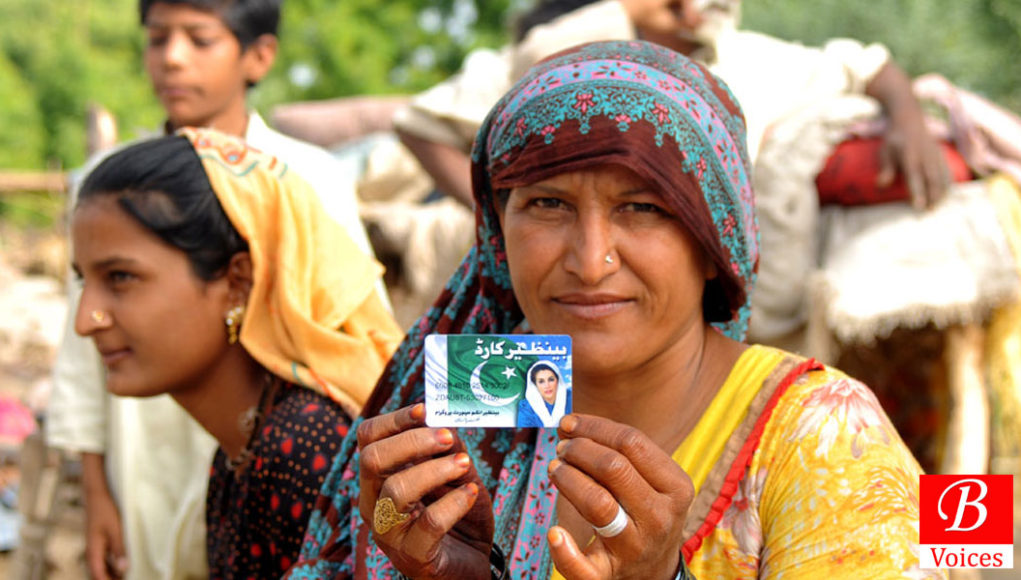Adnan Aamir
In the 2008 general elections, the Pakistan People’s Party (PPP) came to power riding on the slogan of helping the under-privileged sections of society. After taking control of the government, the PPP administration launched the Benazir Income Support Programme (BISP) in October 2008. The stated aim of the BISP was to “cushion the negative effects of slow economic growth, the food crisis and inflation on the poor, particularly women, through the provision of cash transfers.” Between October 2008-March 2016, Rs. 387 billion had been disbursed through the BISP, but it is generally believed that the programme has failed to economically empower the under-privileged sections of society.
The BISP was established as the third cash transfer social security net in Pakistan, after Zakat and the Pakistan Baitul Maal. The BISP started with an annual budget of Rs. 34 billion and today it is the largest social security net of Pakistan.
The modus operandi of the BISP is that it provides Rs. 4,700 per household, every three months. These cash transfers are non-conditional and all households graded poor according to BISP standards are paid these amounts.
Apart from that, the BISP had initiated other programmes such as Waseela-e-Haq, Waseela-e-Taleem and Waseela-e-Rozgar, which provided soft loans for education and business ventures. However, these programmes formed a negligible portion of the entire BISP structure and some of them are either non-functional or they have been scrapped.
In its first year of operations, the BISP provided cash transfers to 1.7 million households and this figure rose to 4.7 million in the year 2014. According to the 2010-11 poverty census conducted by the BISP, there are 7.7 million households in Pakistan who are eligible to receive BISP cash transfers.
In the first year, the BISP disbursed Rs. 16 billion to deserving households and this figure rose up to Rs. 102 billon in 2016. As of March 2016, a massive amount of Rs. 387 billion has been disbursed in cash transfers. That’s Rs. 55 billion per annum on an average and makes up 0.23 percent of Pakistan’s GDP (Gross Domestic Product). Have these huge amounts been effectively used, is a question that needs to be answered.
The 11th Five Year Plan of Pakistan for 2013-18 states that the poverty headcount has reduced from 17.2% to 12.4% between 2007-08 to 2010-11. The plan credits the BISP with the reduction in the poverty headcount. Apart from this, there are 17 third-party evaluation reports on the BISP website which claim that BISP has been doing a commendable job in reducing poverty. The Benazir Income Support Programme Second Impact Evaluation Report by Oxford Policy Management in December 2015 also praises the BISP for the improvement in the lives of people but it does not take into account the efficient utilisation of resources disbursed by the BISP over the years. There has been a general reduction in the poverty levels in Pakistan over the course of the last decade. The Multidimensional Poverty Index report launched by UNDP and the Ministry of Planning and Development claims that poverty has gone down from 55% to 39% in the last 10 years. There has been a general reduction in poverty, but to what extent the BISP should be credited for it is hard to ascertain.
Former Senator Enver Baig, who served as Chairman BISP from November 2013 to November 2014, told Newsline that all the money disbursed by BISP over the course of the last eight years was nothing more than a waste of the taxpayer’s money. He stated that the claims made about the success of the BISP in third-party evaluations are not credible and cannot be trusted. In response to a question about the role of the World Bank and foreign donors, Mr. Baig said “I never subscribed to the plans of the World Bank when I was heading the BISP. They [World Bank and foreign donors] are not interested in ending poverty and want people to remain dependent on dole-outs.”
Some financial experts maintain that the cash transfers provided by the BISP are just dole-outs, which are disbursed every quarter without any conditions. Such transfers can never empower the under-privileged sections of society economically and will only keep them dependent. Even if the cash transfers are working out for some households, this approach is not sustainable as the BISP might not be able to provide them cash forever. There needs to be an alternative approach, which is clearly missing.
Shoaib Sultan Khan, head of the National Rural Support Programme and one of the pioneers of rural development programmes in Pakistan who has been working in the field for 40 years, said in a seminar that the BISP can never alleviate poverty because of the flaws in its basic structure.
Mehfooz Ali Khan, former finance secretary of Balochistan and an analyst, told Newsline that the BISP was supposed to work as a social security net, but if a survey were to be conducted one would find out that it didn’t impact the poorest segment. He further added that “the BISP has resulted in the pauperisation of society and paltry dole-outs don’t change poverty levels. Had this amount been used to create enabling environments, it would have had a far-reaching effect.”
Mr. Baig also held the same view. He said that if the hundreds of billions of rupees wasted as cash transfer had been used for technical training then the economic impact would have been far greater for the under-privileged sections of society. In fact, Baig claims that he resigned just after one year in office because the administration of the BISP did not allow him to implement technical training programmes within its ambit.
Moreover, there is another flaw in the BISP, and it is related to the human resource structure. At the moment, the BISP is virtually under the control of officers of other departments who have joined the BISP on deputation. These officers hold all the positions in the BISP on grades above BPS-17. Officers on deputation are paid double the amount of salary in the BISP as compared to their parent departments. As a result, people from an assorted range of organisations, including universities, join the BISP on deputation to make a quick buck. Allegedly, these postings are mostly politically motivated and the officers have no permanent interest in running the affairs of the BISP. Consequently, the organisation suffers.
Likewise, the BISP is one of the biggest heads in the annual fiscal budget of Pakistan. Even so, it receives a negligible amount of criticism in the mainstream media. The reason is the staggering amount of resources which the BISP spends on advertisements, thus ensuring that there is no criticism from media outlets. Till January 2014, Rs. 3.15 billion had been spent on running ad campaigns of the BISP on television channels and in newspapers. Baig told Newsline that one of the reasons he had to quit the BISP was that he moved a case of corruption in BISP advertisements to NAB and the interest groups within the BISP started opposing him.
Moreover, the use of the BISP to gain political mileage has been criticised from the outset. The use of the name ‘Benazir’ as the title of the programme amounts to using the taxpayer’s money to buy political clout. In the past, the PPP was accused of using the BISP to manipulate elections in Gilgit-Baltistan, and this time the same allegations are being levelled against the ruling PML-N. It was alleged that disbursements were increased just before the elections on the instructions of PML-N candidates and that helped them win the elections in Gilgit-Baltistan.
Given the criticism being hurled at the BISP, the need of the hour is to depoliticise BISP and get rid of all those staffers who are on deputation. The programme must be managed by professionals; furthermore, there is also the need to change the basic outlook of the programme. Gradually, the cash dole-out system must be wound up and replaced with technical training programmes and all cash transfers must be conditional.
Originally published in Newsline Magazine
Share your comments!








